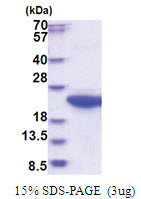CAPNS1 (84-268, His-tag) Human Protein
Other products for "CAPNS1"
Specifications
| Product Data | |
| Species | Human |
| Expression Host | E. coli |
| Expression cDNA Clone or AA Sequence |
MGSSHHHHHH SSGLVPRGSH MGSRTHYSNI EANESEEVRQ FRRLFAQLAG DDMEVSATEL MNILNKVVTR HPDLKTDGFG IDTCRSMVAV MDSDTTGKLG FEEFKYLWNN IKRWQAIYKQ FDTDRSGTIC SSELPGAFEA AGFHLNEHLY NMIIRRYSDE SGNMDFDNFI SCLVRLDAMF RAFKSLDKDG TGQIQVNIQE WLQLTMYS
|
| Tag | His-tag |
| Predicted MW | 23.8 kDa |
| Concentration | lot specific |
| Purity | >95% by SDS - PAGE |
| Presentation | Purified |
| Buffer | Presentation State: Purified State: Liquid purified protein Buffer System: 20 mM Tris-HCl buffer (pH 8.0) containing 0.15M NaCl, 20% glycerol, 1 mM DTT |
| Preparation | Liquid purified protein |
| Protein Description | Recombinant human CAPNS1 protein, fused to His-tag at N-terminus, was expressed in E.coli and purified by using conventional chromatography techniques. |
| Storage | Store undiluted at 2-8°C for one week or (in aliquots) at -20°C to -80°C for longer. Avoid repeated freezing and thawing. |
| Stability | Shelf life: one year from despatch. |
| Reference Data | |
| RefSeq | NP_001003962 |
| Locus ID | 826 |
| UniProt ID | P04632 |
| Cytogenetics | 19q13.12 |
| Synonyms | CALPAIN4; CANP; CANPS; CAPN4; CDPS; CSS1 |
| Summary | This gene is a member of the calpain small subunit family. Calpains are calcium-dependent cysteine proteinases that are widely distributed in mammalian cells. Calpains operate as heterodimers, comprising a specific large catalytic subunit (calpain 1 subunit in Calpain I, and calpain 2 subunit in Calpain II), and a common small regulatory subunit encoded by this gene. This encoded protein is essential for the stability and function of both calpain heterodimers, whose proteolytic activities influence various cellular functions including apoptosis, proliferation, migration, adhesion, and autophagy. Calpains have been implicated in neurodegenerative processes, such as myotonic dystrophy. A pseudogene of this gene has been defined on chromosome 1. Alternative splicing results in multiple transcript variants. [provided by RefSeq, Oct 2014] |
| Protein Families | Druggable Genome, Protease |
Documents
| FAQs |
| SDS |
Resources
Recombinant Protein Resources |
{0} Product Review(s)
0 Product Review(s)
Submit review
Be the first one to submit a review
Product Citations
*Delivery time may vary from web posted schedule. Occasional delays may occur due to unforeseen
complexities in the preparation of your product. International customers may expect an additional 1-2 weeks
in shipping.






























































































































































































































































 Germany
Germany
 Japan
Japan
 United Kingdom
United Kingdom
 China
China
